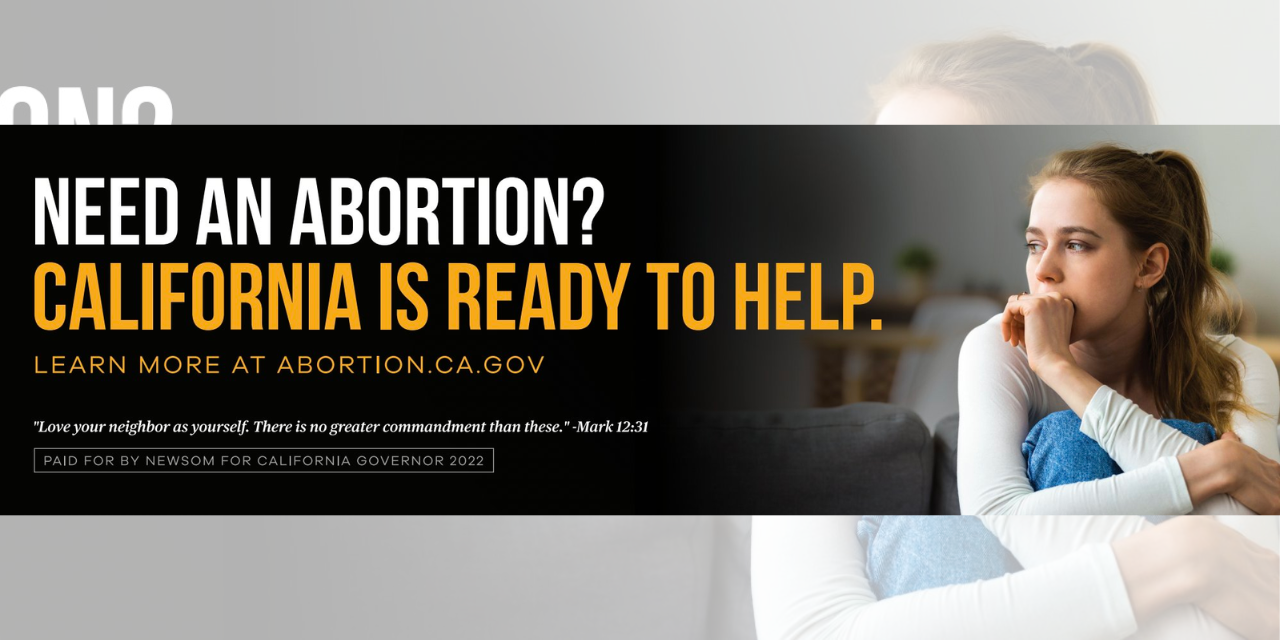The California legislature sent 13 new abortion bills to Governor Gavin Newsom’s desk earlier this month. He signed all of them into law on September 27.
The bills were championed by the California Future of Abortion Council, a group convened in the fall of 2021, when abortion activists were fearful the U.S. Supreme Court would possibly overturn Roe v. Wade.
The council, consisting of representative from anti-life groups like NARAL Pro-Choice California and Planned Parenthood Affiliates of California, developed a package of 45 budget, legislative, research and administrative recommendations.
California Family Council (CFC), a Focus on the Family-allied organization, condemned the new legislation and listed some of the new measures that are now law in California, along with budget allocations and legislation enacted earlier this year:
- AB 204 allocates $20 millionof taxpayer money for women from other states to travel to California to receive an abortion.
- AB 1666prohibits California law enforcement from cooperating with abortion investigations occurring in other states, as long as the abortion was legal under California law.
- AB 2091prohibits medical information pertaining to abortions from being shared with other states.
- AB 2223removes the requirement that a coroner investigate deaths that resulted from self-induced or criminal abortions and prohibits a coroner’s statements about fetal death from being used in a criminal prosecution against a mother or anyone assisting her.
- SB 1375 lowers health standards for abortions by authorizing nurse practitioners and nurse-midwives to perform first-trimester abortions without the supervision of a physician.
- AB 1918sets up scholarships for medical students and loan repayment for graduates who commit to three years as an abortionist in California.
- SB 1142provides money to pregnant mothers for abortion-related costs, including expenses related to travel, lodging, childcare, meals, doula support, and translation services — both for Californians and those coming from other states.
The state also launched a website and billboard campaign, placing billboards in pro-life states like Texas, Indiana, Ohio, Mississippi, South Dakota, South Carolina, and Oklahoma.
They read, “Need an abortion? California is ready to help,” among other pro-abortion messages.
The billboards in Mississippi and Oklahoma quote Jesus in Mark 12 to justify abortion, proclaiming, “Love your neighbor as yourself. There is no greater commandment than these.”
CFC called this “a deeply perverted justification for helping women obtain abortion.” The organization reports:
The billboards advertise the website, abortion.ca.gov, which offers information to women in states where abortion is restricted to help them access the procedure in California.
It also instructs out-of-state minors on how to get an abortion in California without their parents’ permission and includes a section informing undocumented immigrants on how they can obtain taxpayer-funded coverage for abortion (their emphasis).
The abortion website touts minors’ easy access to aborting their pre-born infants:
In California, people of any age have the right to independently consent to their own abortion care.
The legislature also placed Proposition 1, a constitutional amendment on the November 8 ballot. It gives unlimited access to abortion throughout all nine months of pregnancy, allowing for healthy babies to be killed right until the moment of birth.
As CFC reports, “Currently in California, abortion is legal only up to the point of viability, unless the mother’s life or health is endangered.”
But Proposition 1, “The Right to Reproductive Freedom Act” amends the state constitution to place no restrictions on “reproductive freedom.” It reads:
The state shall not deny or interfere with an individual’s reproductive freedom in their most intimate decisions, which includes their fundamental right to choose to have an abortion and their fundamental right to choose or refuse contraceptives.
The California Senate voted in favor of placing the constitutional amendment on the ballot with a vote of 29 in favor and 8 against. The House approved the measure 58 to 17.
Early voting in California begins October 10, and voters will decide whether the state constitution should include this unlimited access to abortion.
Find more information and voter resources about Proposition 1:
- California Family Council: Proposition 1
- California Catholic Conference – No on Prop 1
- California Together: No Prop 1
- Stop Prop 1
Related articles and resources:
- California Legislation Would Decriminalize Killing Newborns
- California Wants to Become an ‘Abortion Sanctuary’ if ‘Roe v. Wade’ is Overturned
- Focus on the Family: Pro-Life Resources
- I Am Pro-Life – Facebook Page
- Life is on the Ballot this November 8 – With Spending Millions to Support Legalized Abortion
Photo from Twitter.






